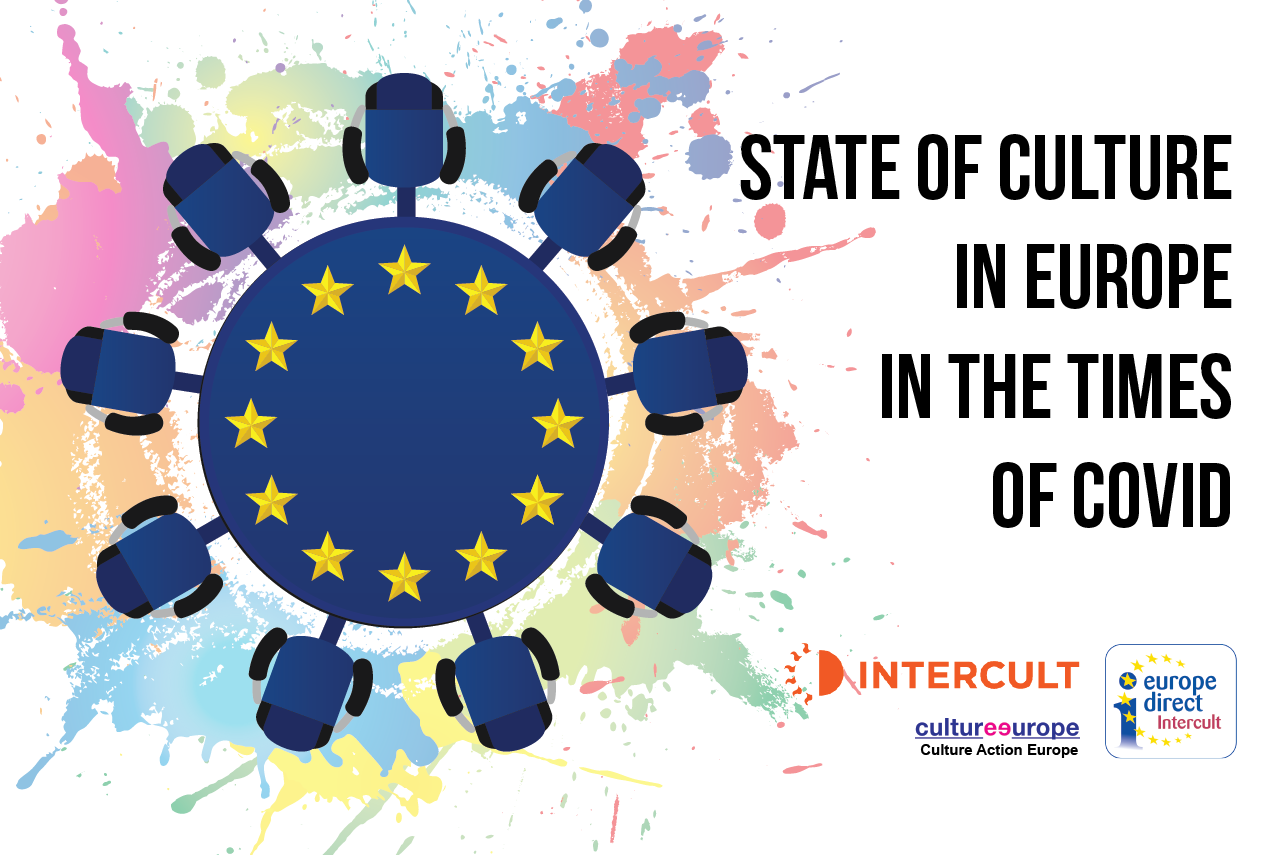The webinar State of Culture in Europe in the Times of COVID-19 is part of a series of Intercult’s seminars discussing different themes in relation to Europe, such as cultural heritage, European cultural politics and the impact of the COVID-19 pandemic. The webinars are livestreamed on Intercult’s Facebook page every other Wednesday. This webinar was livestreamed on the 15th of May 2020. What follows is a short summary of this webinar.
Inter-cultural competence is essential in our ever-changing world, says Intercult CEO Iwona Preis. Intercultural and international encounters, open dialogues and projects help promote inter-cultural competence. She emphasizes how cultural creativity is in fact necessary to survival and mental well-being. Right now cultural and creative sectors are experiencing a global emergency, however the national measures taken to mitigate the consequences of the pandemic are often criticized as insufficient. The cultural and creative sectors in particular are suffering greatly from loss of revenue and unemployment; unless protected and aided, the cultural economy will be in danger of collapse. What can the EU do to support and strengthen the cultural and creative sectors during the pandemic? What measures and policies are being developed in support of the European cultural sectors and how can programmes like Creative Europe help ensure the survival of European culture in the times of COVID-19?
These questions were discussed by two representatives from Culture Action Europe in Brussels; Natalie Giorgadze, Communications & Community Director and Gabriele Rosana, Policy Director. Natalie Giorgadze emphasizes the need for open dialogues and public debates with different stakeholders during this crisis. Culture Action Europe is a cultural network whose mission is to put culture at the heart of the European public debate. The Culture Action Europe members come from every part of the cultural and creative sectors; they include both individual artists and activists, networks, organizations and policymakers.
Long term planning has been made difficult by the uncertainty and precariousness of the situation. How can the cultural sectors adjust to the new requirements during the lockdown? Due to the lockdown, the mobility of artists and cultural workers has been restricted. This creates new challenges for the cultural and creative sectors, who depend on mobility and international collaborations to function. Digitalisation can only ever be a temporary solution. Offering culture only on specific, targeted platforms could also compromise the accessibility and diversity of cultural representation. Today, many nations focus on preserving the national cultural sector, however it is important to work together to support European cultural sectors. The aid programs developed during the crisis are directed at safeguarding only the national cultural sectors. New EU policies may be needed to ensure the survival of the cultural and creative sectors. The crisis may result in irreversible losses for the cultural sectors. Now is the time to stand up for culture and the arts. Specific aid packages are needed to protect the cultural and creative sectors.
What are some of the EU measures taken to protect culture and the arts? Policy Director Gabriele Rosana explains that the EU policies are meant to support and supplement the national measures taken by the EU member states. Now EU has been asked to do more – to fill in the gaps left by the national aid programmes. On the 8th of April the EU member states were asked to benchmark measures at national level, so that EU could develop additional measures accordingly. Consequently, the EU developed the SURE instrument, intended to support short term schemes for people who are losing their jobs because of the crisis. The SURE instrument will be in place by the 1st of June. Additionally, the EU has developed temporary frameworks allowing state aids; a number of state aids have been authorized to compensate for cancelled cultural events.
Culture can be a fourth pillar – along with environmental, social and economic pillars – in the process and work for a more sustainable development in Europe. Now is the time to reflect and discuss possible new policies, methods and solutions for the cultural and creative sectors.
State of Culture in Europe in the Times of COVID-19 was organised in collaboration with Culture Action Europe. The moderator of this webinar was Iwona Preis, CEO Intercult. The webinar can be viewed in its entirety on Intercult’s Facebook page.
* The MFF (Multiannual financial framework) for 2021 – 2027 has now become a cornerstone of the EU relaunch program; it will most likely finance the recovery plan for Europe. If we want to relaunch Europe, culture needs to be put at the heart of the recovery plan strategies, Gabriele Rosana argues. It is crucial to recognize the importance of the cultural and creative sectors, and to include them in the recovery schemes to relaunch Europe. However, the 28th May the European Commission announced a new proposal of budgets for Creative Europe and Erasmus +, and the promises aside the budget has been significantly cut. CULT committee was disappointed and commented that figures are far below Commission´s original proposal. “The Covid-19 pandemic has also ravaged the cultural and creative and media sectors across Europe, but the proposal – a decrease compared to the 2018 proposal – ignores this impact completely. Creative Europe is the only EU programme that provides direct support to these sectors. The European Parliament has called on the Commission time and time again to put in place an ambitious plan to help the sectors recover, but the Commission is missing this opportunity and sending a terrible message.” says the CULT committee of the EP.
Reading tips:
CULT Committee of the European Parliament disappointed with budget proposals May 28th 2020
https://cultureactioneurope.org/news/cult-committee-disappointed-with-budget-proposals/
Read more about Culture Action Europe here!
https://cultureactioneurope.org
Join the hashtag #Actforculture!
Read more about the SURE instrument here!
Read more about The European Pillar of Social Rights here:
